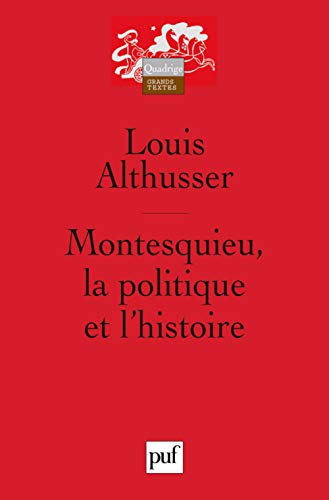
Montesquieu, politika i povijest
2003
First Published
3.65
Average Rating
128
Number of Pages
U knjizi “Montesquieu, politika i povijest” (“Montesquieu, la politique et l’histoire”, 1959) francuski marksistički filozof Louis Althusser analizira djelo velikoga francuskoga prosvjetiteljskog mislioca Charlesa de Montesquieua. Pri obradi predmeta autor ne polazi od biografskih datosti ni utjecaja obiteljskog okruženja i društvenih okolnosti, već poduzima “analizu iznutra” te nastoji rasvijetliti jedinstvo Montesquieuova opusa i istaknuti politička polazišta koja ga nadahnjuju. Na početku se usredotočuje na revolucionarnost Montesquieuove metode i njegove teorije zakona. Na toj osnovi objašnjava tipologiju oblika državne vlasti koju Montesquieu predlaže te sugerira da se tu jasno pokazuju političke preferencije potonjega. Dokazujući da Montesquieu nikad nije bio teoretičar podjele ili diobe vlasti, ustvrđuje da je, iako je napravio velik korak prema znanstvenoj politici, ostao žrtvom ideologije svojeg vremena i klase. Prema Althusseru, Montesquieuova pravna analiza samo skriva precizan politički izbor filozofa koji, opisujući moguće režime, privilegirano mjesto daje plemstvu, kojemu i sam pripada.
Avg Rating
3.65
Number of Ratings
23
5 STARS
17%
4 STARS
39%
3 STARS
35%
2 STARS
9%
1 STARS
0%
goodreads
Author

Louis Althusser
Author · 24 books
Louis Pierre Althusser (1918–1990) was one of the most influential Marxist philosophers of the 20th Century. As they seemed to offer a renewal of Marxist thought as well as to render Marxism philosophically respectable, the claims he advanced in the 1960s about Marxist philosophy were discussed and debated worldwide. Due to apparent reversals in his theoretical positions, to the ill-fated facts of his life, and to the historical fortunes of Marxism in the late twentieth century, this intense interest in Althusser's reading of Marx did not survive the 1970s. Despite the comparative indifference shown to his work as a whole after these events, the theory of ideology Althusser developed within it has been broadly deployed in the social sciences and humanities and has provided a foundation for much “post-Marxist” philosophy. In addition, aspects of Althusser's project have served as inspiration for Analytic Marxism as well as for Critical Realism. Though this influence is not always explicit, Althusser's work and that of his students continues to inform the research programs of literary studies, political philosophy, history, economics, and sociology. In addition, his autobiography has been subject to much critical attention over the last decade. At present, Althusser's philosophy as a whole is undergoing a critical reevaluation by scholars who have benefited from the anthologization of hard-to-find and previously unpublished texts and who have begun to engage with the great mass of writings that remain in his archives.